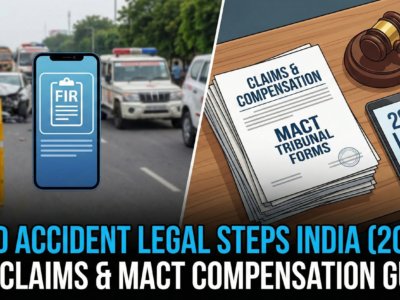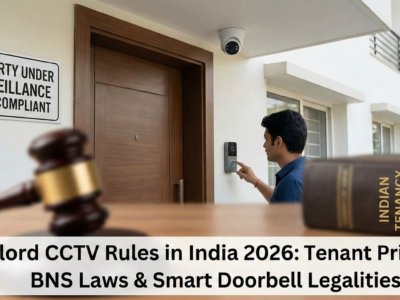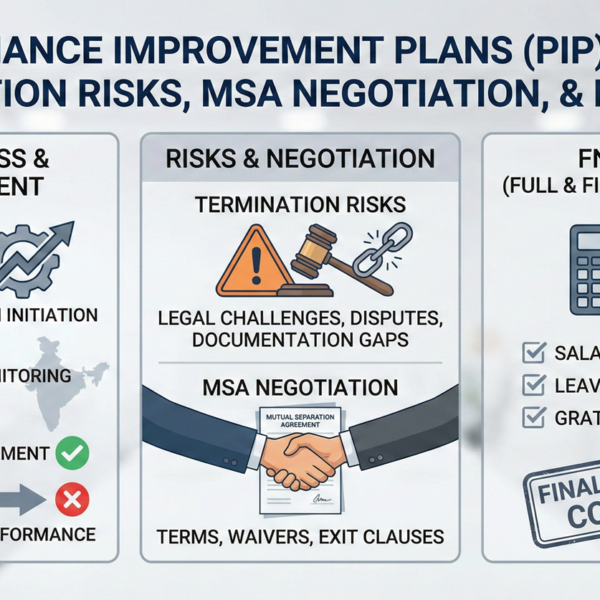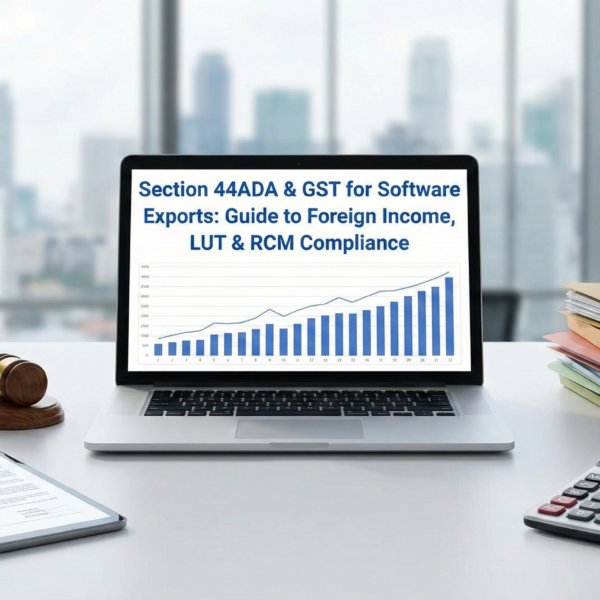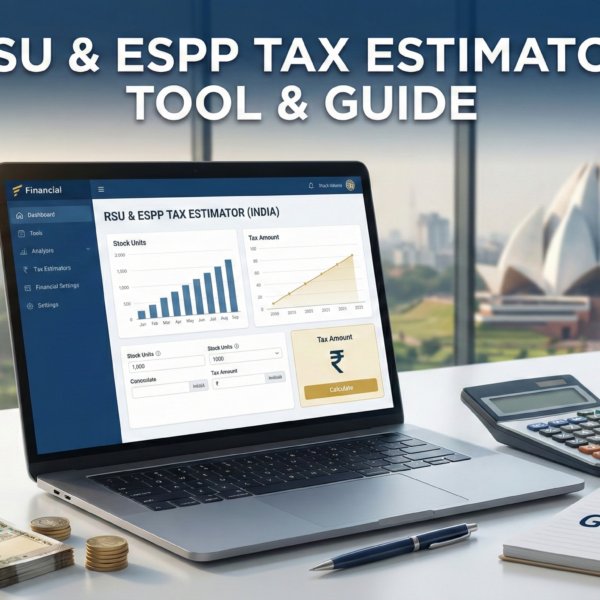Bribe Demand at Indian Customs? A 2025 Legal Guide for Importers
For an importer in India, facing a bribe demand from a customs official during the clearance of goods is a high-stakes crisis. Capitulating not only involves financial loss but also exposes you to severe criminal liability under the Prevention of Corruption Act, 1988, while refusing can lead to indefinite delays and harassment. This comprehensive guide from Evaakil.com, with a focus on procedures at major ports like Kolkata, West Bengal, is your definitive legal and strategic action plan. We detail the entire legal framework, your rights, the correct reporting channels from the CVC to the CBI, and provide practical templates to help you navigate this challenge lawfully and protect your business from the risks of corruption.
Navigating Demands for Bribes at Indian Customs
A Legal and Procedural Guide for Importers to Lawfully Navigate and Report Corruption.
An importer facing a demand for an illicit payment from a customs official is in a precarious legal position. This guide provides a step-by-step analysis of the legal framework, official procedures, and strategic actions necessary to protect your business and uphold the law. Understanding these elements is critical to transforming a crisis into a resolved, compliant outcome.
Section 1: The Legal Framework of Bribery
The Prevention of Corruption Act, 1988 (PCA) is the primary statute governing bribery. It makes capitulating to a bribe demand not a commercial solution, but an entry into a serious criminal matter with severe consequences for both the bribe-giver and the bribe-taker.
Criminal Culpability: A Two-Way Street
Bribe-Taker (The Official)
Obtaining an "undue advantage" to perform a duty improperly.
3 to 7 years imprisonment
+ Liable to a fine
Bribe-Giver (The Importer)
Giving an "undue advantage" to induce an improper act.
Up to 7 years imprisonment
or a fine, or both
A Critical Lifeline: The 7-Day Reporting Window
Your Affirmative Defense
If compelled to pay a bribe, you are protected from prosecution ONLY IF you report the incident to law enforcement within SEVEN DAYS. This is a non-negotiable, time-sensitive legal safe harbor.
Section 2: The Legitimate Customs Clearance Protocol
Understanding the official, digitized customs process is your best defense. A corrupt demand is a deviation from this transparent protocol. Here’s how it’s supposed to work.
Pre-Arrival & E-Filing
Carrier files Import General Manifest (IGM). Importer/Broker files Bill of Entry (BoE) and supporting documents via the online ICEGATE portal using 'e-Sanchit'.
Assessment & Examination
The Risk Management System (RMS) analyzes the BoE. It either clears it (Green Channel) or flags it for assessment/physical examination by an officer.
Duty Payment
After assessment, the system generates an e-challan for duties and taxes. Payment is made through official online banking channels on ICEGATE.
"Out of Charge" Order
Once duties are paid and checks are complete, the officer issues an electronic "Out of Charge" order. This is the final, legal authorization to release the goods.
Red Flags of Corruption vs. Legitimate Charges
Payment to Personal Account
Demand for Cash
No Official Receipt
"Speed" or "Facilitation" Fees
Section 3: Avenues of Redress: Reporting Corruption
When faced with a bribe demand, you have several formal channels for reporting. The choice is strategic and depends on your evidence and desired outcome.
| Channel | Primary Function | Best For |
|---|---|---|
| Central Vigilance Commission (CVC) | Apex Supervisory & Advisory Body | Ensuring high-level, impartial oversight and preventing suppression of the complaint. |
| DG Vigilance, CBIC | Internal Departmental Vigilance | Cases with clear evidence requiring swift internal action and access to departmental records. |
| Central Bureau of Investigation (CBI) | Premier Criminal Investigation Agency | Serious criminal cases with strong evidence where the goal is criminal prosecution and arrest. |
| CPGRAMS Portal | General Public Grievance Redressal | Creating an initial official record of a service issue (e.g., delays) before escalating as a corruption case. |
Section 4: Safeguards for the Complainant
The law provides protections for those who report corruption, but it's vital to understand both the strengths and practical limitations of the framework.
Whistle Blowers Protection Act, 2014: A Realistic Assessment
Section 5: Strategic Action Plan & Professional Counsel
A bribe demand is a crisis that requires a calm, strategic, and legally sound response. Follow these steps to navigate the situation effectively.
Immediate Steps When Faced with a Demand
-
1
Do Not Pay. Paying the bribe is a separate criminal offense under the PCA with severe penalties.
-
2
Disengage & Document. Calmly refuse and immediately write down every detail of the interaction: name, date, time, words used.
-
3
Preserve All Evidence. Save related emails, messages, and call logs. Secure any written demands or witness information.
-
4
Engage Legal Counsel Immediately. This is the most critical step. An expert in anti-corruption and customs law will provide a strategic shield, manage communications, and build a compelling legal case.
Proactive Measures: Building a Compliance Framework
Adopt a Code of Conduct
Institute a formal, zero-tolerance policy against bribery.
Conduct Training
Educate employees on anti-corruption laws and company policy.
Internal Reporting
Create confidential channels for employees to raise concerns.
Due Diligence on Partners
Vet third-party agents like customs brokers for compliance.
Section 6: The Role of Customs House Agents (CHAs)
Customs House Agents or Brokers are licensed intermediaries who are vital to the import-export ecosystem. However, they can also be a point of vulnerability. Understanding their legal obligations and your liability is crucial.
Vicarious Liability & Due Diligence
While you delegate tasks to a CHA, you, as the importer, retain ultimate legal responsibility for the accuracy of declarations made on your behalf. If a CHA pays a bribe, purportedly for you, the legal exposure can extend to your business. Therefore, rigorous due diligence is not just good practice; it's a legal shield.
Key Due Diligence Steps for CHAs
- Verify Licensing: Confirm their license is valid under the Customs Brokers Licensing Regulations, 2018.
- Reputation Check: Seek industry references and check for any past penalties or blacklisting.
- Contractual Clarity: Have a clear, written agreement that explicitly forbids illicit payments and outlines their exact scope of work.
- Audit Trail: Insist on itemized invoices and original receipts for all charges and duties paid.
Section 7: Evidence in the Digital Age
In corruption cases, evidence is often circumstantial. Digital communications can be the "smoking gun," but their admissibility in court depends on proper certification under the Indian Evidence Act, 1872.
Gathering Legally Admissible Digital Evidence
Emails & Messages
Archive all communication. Do not delete threads, even if they seem inconclusive. Metadata (time, sender) is critical.
Call Recordings
While complex, recordings can be powerful. The legality of recording calls without consent varies; consult legal counsel before acting.
Section 65B Certificate
This is a mandatory affidavit that certifies the authenticity and integrity of electronic evidence. Without it, your digital proof may be dismissed in court.
Section 8: Landmark Judgements & Precedents
Judicial precedents shape how anti-corruption laws are interpreted and enforced. These cases highlight the judiciary's stance on demands for bribes and the burden of proof.
A. Subair vs. State of Kerala (2009)
Ruling: The Supreme Court held that mere possession or acceptance of money is not enough to prove a bribe. The prosecution must prove that the money was taken as a motive or reward for an official act (i.e., a demand was made and fulfilled).
Implication for Importers: This places a high burden of proof on enforcement agencies. Your documented evidence of the *demand* is critical to building a case against an official.
State of Punjab vs. Madan Mohan Lal Verma (2013)
Ruling: The Supreme Court clarified that if a public servant is caught accepting illegal gratification, the presumption is that it was accepted as a bribe. The burden then shifts to the accused official to prove it was not for a corrupt purpose.
Implication for Importers: If you participate in a "trap" operation with the CBI, the very act of the official accepting the marked currency creates a strong presumption of guilt against them.
Section 9: Frequently Asked Questions
What is a "facilitation payment" and is it legal in India?
A "facilitation payment" or "speed money" is a small payment to secure or expedite a routine government action. Unlike some foreign laws (like the US FCPA), Indian law does not recognize this distinction. Any payment to an official for performing their duty is considered a bribe under the PCA, 1988.
My goods are perishable. Can I pay the bribe under duress and report it?
This is a high-risk scenario. The law provides a 7-day window to report a bribe you were compelled to pay. If you choose this path, you MUST report it within seven days to claim protection from prosecution. Documenting the "coercion" (e.g., noting the risk of spoilage in a formal email to the official) is vital before you pay. However, the safest legal route is always to refuse and escalate.
Will reporting a customs official lead to my future shipments being targeted?
This is a legitimate fear. Retaliation is possible. However, filing a formal complaint with high-level bodies like the CVC or DG Vigilance creates a protective record. These bodies are aware of potential victimization and can monitor the situation. Furthermore, the move towards faceless, randomized assessments in customs is designed to reduce the ability of any single officer to target a specific importer.
What's the difference between a customs duty and a bribe?
A customs duty is a legal tax levied by the government on imported goods. It is calculated based on the goods' classification and value, paid through official government banking channels (like the ICEGATE portal), and you receive an official, system-generated receipt. A bribe is an illicit, off-the-books payment demanded by an individual official, paid in cash or to a personal account, with no official receipt, to influence their duty.
Section 10: The Rise of Faceless Assessment (Turant Customs)
Launched as a flagship reform, Turant (Immediate) Customs and its Faceless Assessment component are designed to fundamentally change the import clearance process. The core objective is to enhance efficiency and reduce corruption by breaking the direct link between the importer/CHA and the assessing customs officer.
How Faceless Assessment Works
The Old System
- Face-to-face interaction was common.
- Bill of Entry was assigned to a specific officer at the port of import.
- High degree of individual officer discretion and potential for 'speed money' demands.
The New Faceless System
- Bill of Entry is assigned randomly by a central system.
- The assessing officer is anonymous and could be in any city in India.
- Drastically reduces the opportunity for direct contact and corrupt demands.
While Faceless Assessment covers the documentation and duty calculation phase, importers should note that physical examination of goods (if required) still happens at the port of arrival. This remains a potential point of human interface where vigilance is required.
Section 11: International Conventions & India's Commitments
India's domestic anti-corruption laws are reinforced by its commitments under international treaties. This global framework provides context and sometimes additional avenues for redress, particularly for multinational corporations.
UN Convention against Corruption (UNCAC)
As a signatory, India is obligated to uphold key UNCAC principles. This includes the criminalization of both active (giving) and passive (receiving) bribery of public officials. The convention also establishes frameworks for international cooperation in investigation and asset recovery, meaning illicit funds moved abroad can be traced.
OECD Anti-Bribery Convention & Foreign Corrupt Practices Act (FCPA)
While India is not a signatory to the OECD convention, its principles are a global benchmark. For foreign companies from signatory countries, or those listed on U.S. stock exchanges (subject to the FCPA), paying a bribe to an Indian customs official can lead to severe prosecution in their home country, in addition to penalties in India.
Section 12: Beyond Bribery - The Money Laundering Connection
Paying a bribe is not just a violation of the Prevention of Corruption Act. It can trigger the far more stringent provisions of the Prevention of Money Laundering Act, 2002 (PMLA), significantly raising the legal and financial stakes.
The Escalation to a PMLA Offense
Step 1: The Bribe
Offense under the PCA, 1988 (Predicate Offense).
Step 2: Illicit Funds
The bribe money becomes "proceeds of crime".
Step 3: PMLA Triggered
Any attempt to conceal or use these funds is money laundering.
Why This Matters
The PMLA carries severe consequences, including rigorous imprisonment from 3 to 7 years and the power for the Enforcement Directorate (ED) to provisionally attach properties and bank accounts believed to be involved in the crime. The legal bar for securing bail is also significantly higher under PMLA, making it a powerful deterrent.
Section 13: Pre-Import Compliance Checklist
The best way to avoid being vulnerable to corrupt demands is to ensure your own documentation and processes are flawless. A compliant and well-documented shipment gives a corrupt official no leverage to create artificial delays.
Correct HS Classification
Ensure every item is classified under the correct HSN code to avoid disputes.
Accurate Valuation
Declare the true transaction value as per Customs Valuation Rules. Do not under- or over-invoice.
Complete Documentation
Upload clear, legible copies of invoice, packing list, bill of lading, and certificate of origin to e-Sanchit.
Required Permits Ready
Have all necessary licenses or certificates (e.g., BIS, FSSAI, ADC) ready before the goods arrive.
Section 14: Beyond Bribery: The Role of DRI & Economic Intelligence
Often, a demand for a bribe is disguised as a threat to escalate a matter for a supposed violation of customs law. Understanding the agencies that handle these underlying economic offenses is key to calling an official's bluff.
Two Sides of the Same Coin: Corruption vs. Customs Offenses
Directorate of Revenue Intelligence (DRI)
The DRI is the lead intelligence agency for customs matters. It does not primarily investigate bribery but focuses on the underlying commercial crime.
- Mis-declaration of goods
- Valuation fraud (under/over-invoicing)
- Smuggling and contraband
- Abuse of export promotion schemes
Central Bureau of Investigation (CBI)
The CBI's Anti-Corruption Branch investigates the act of corruption itself, as defined under the Prevention of Corruption Act.
- Demand and acceptance of a bribe
- Possession of disproportionate assets
- Abuse of official position for gain
- Criminal conspiracy
Knowing this distinction is powerful. If your paperwork is compliant, you can be confident that a threat of a "DRI case" is likely baseless leverage for a bribe, which strengthens your position to refuse and report the official to the CBI or CVC.
Section 15: State-Level Recourse: The Anti-Corruption Bureau (ACB)
While the CBI and CVC are premier federal agencies, every state has its own Anti-Corruption Bureau (ACB) or Vigilance department. These can be effective and more accessible for certain situations.
Leveraging Local Jurisdiction: The West Bengal Example
For importers operating in Kolkata, the Directorate of Anti-Corruption, West Bengal, is a key agency. It is empowered to investigate corruption cases against state government officials and can also take up cases involving central government officials stationed within the state, often in coordination with federal agencies.
When to Consider the State ACB
- Speed and Accessibility: Approaching a local ACB office might be quicker and less intimidating than reaching out to a national agency in Delhi.
- Joint Operations: State ACBs often conduct "trap" operations to catch officials red-handed, sometimes with greater speed than federal counterparts.
- Local Nexus: If the corruption involves a network of local agents and state-level functionaries alongside a central official, the ACB's local intelligence can be invaluable.
Section 16: Your Digital Shield: Leveraging the Audit Trail
The modern customs process is built on a digital foundation. This mandatory electronic trail is not just for efficiency; it's your most powerful, impartial evidence against manufactured delays and illicit demands.
The Unbreakable Chain of Digital Evidence
e-Sanchit Uploads
Every document you upload (invoice, packing list, etc.) is digitally time-stamped. This proves you submitted all required documents at a specific time, preempting claims of "missing papers."
ICEGATE Query-Reply Module
Any legitimate query from an officer must be raised electronically through the ICEGATE portal. Your reply is also logged. An officer avoiding the online system to make verbal demands is a major red flag and evidence in itself.
System Logs and Timestamps
The Customs system logs every single action taken on your Bill of Entry—when it was viewed, by whom, and for how long. Unexplained "dwell time" where the file is held without action can be evidence of an intentional delay.
Your strategy should be to always force the conversation back onto these official digital channels. Ask for all queries in writing via ICEGATE, which documents the interaction and often deters corrupt demands.
Section 17: Case Study: Responding to a Demand at Kolkata Port
Let's apply the principles from this guide to a practical, hypothetical scenario for an importer based in Kolkata as of September 2025.
The Scenario
M/s. Bengal Traders imports a consignment of high-value industrial machinery parts. The Bill of Entry is correctly filed, but the shipment is flagged for mandatory physical examination at the Kolkata Port docks. During the examination, the officer claims a minor discrepancy between the packing list and physical count and demands ₹1,00,000 in cash to "avoid filing an offense report and seizing the goods."
A Strategic, Step-by-Step Response
-
1
Immediate, Polite Refusal: The CHA, trained on M/s. Bengal Traders' zero-tolerance policy, politely states they cannot handle cash payments. They request the officer to issue an official inspection report and a written memo (panchnama) detailing the alleged discrepancy, so they can reply formally through the ICEGATE portal.
-
2
Internal Documentation: The CHA immediately leaves the examination area and calls the importer. A detailed email is sent from the CHA to the importer, timestamping the event and recording the officer's name, the demand made, and the exact words used.
-
3
Proactive Digital Communication: Legal counsel is engaged. On their advice, the importer immediately sends an official email to the Commissioner of Customs (Port), with a copy to the public grievance officer, stating: "Ref: BoE #XXXXX. Our goods are undergoing examination. We are awaiting the official report from the assigned officer to address any queries. We request this be expedited." This creates a high-level, time-stamped record of the delay without making a direct accusation yet.
-
4
Formal Complaint: With the digital trail established, a formal, confidential complaint is filed online with the CVC, naming the official and providing all details. The complaint references the prior email to the Commissioner as evidence of the ongoing delay.
Outcome: The proactive email to the Commissioner triggers internal alerts about the delay. The CVC complaint initiates a formal vigilance inquiry. Faced with scrutiny from multiple channels, the demand is dropped, and the shipment is cleared based on its merits. The corrupt official is now subject to a formal investigation.
Section 18: First Line of Defense: Internal CBIC Grievance Mechanisms
Before escalating a matter to external agencies like the CBI or CVC, importers can and should utilize the internal grievance redressal mechanisms within the Central Board of Indirect Taxes and Customs (CBIC). This can be a faster, less adversarial way to resolve issues of deliberate delay or harassment.
The Escalation Ladder
Public Grievance Officer (PGO)
Every Customs Commissionerate has a designated PGO, typically an Assistant/Deputy Commissioner. They are the primary point of contact for any service-related grievance. A formal, written complaint about an unexplained delay can often resolve the issue promptly.
The Commissioner of Customs
If the PGO is unresponsive, a direct, written representation to the head of the Commissionerate, the Commissioner, is the next step. This brings the issue to the attention of the highest authority at the local level, who is responsible for the conduct of their officers.
Chief Commissioner of Customs
The Chief Commissioner oversees multiple Commissionerates within a zone (e.g., Kolkata Zone). Escalating the matter here ensures zonal-level oversight and is a powerful step if local-level redress is not forthcoming.
Section 19: A Hidden Risk: The Benami Transaction Angle
Paying a bribe through a third party (like a CHA or another intermediary) to conceal your direct involvement does not protect you. Instead, it opens your business to prosecution under the extremely stringent Benami Transactions (Prohibition) Act, 1988.
Anatomy of a Benami Bribe
Beneficial Owner
(The Importer who provides the money and benefits from the transaction)
Benamidar
(The CHA or Agent who physically pays the bribe on the importer's behalf)
The Benami Property
(The illicit "service" or clearance obtained through the bribe)
Severe Consequences
Engaging in a Benami transaction is a criminal offense with penalties that can be more severe than the initial bribery charge. These include:
- Rigorous imprisonment for up to seven years.
- A fine of up to 25% of the fair market value of the property/benefit.
- Confiscation of the property or benefit derived from the transaction by the government.
Section 20: Post-Clearance Audit (PCA): The Department's Internal Watchdog
An importer's interaction with customs doesn't end when the goods leave the port. The department's Post-Clearance Audit (PCA) system is a crucial internal control that can uncover wrongdoing long after a shipment has been cleared, acting as a powerful deterrent against collusion at the border.
How PCA Works
A separate team of audit officers, completely independent of the assessing officers, scrutinizes Bills of Entry and related documents after the goods have been cleared. They look for patterns of misclassification, undervaluation, or incorrect duty payments. If an officer improperly cleared a shipment in exchange for a bribe, a PCA can easily flag the revenue loss, triggering an investigation into both the importer and the officer involved.
Section 21: Practical Guide: Filing a CVC Complaint Online
Filing a complaint with the Central Vigilance Commission is a formal, serious step. The CVC's online portal is designed to be secure and confidential. Here is a step-by-step guide to lodging a complaint effectively.
- Visit the Portal: Navigate to the official CVC website and find the "Lodge Complaint" section. Choose to file as a "Whistle-blower" under the PIDPI resolution for maximum confidentiality.
- Provide Identity (Kept Confidential): Under PIDPI, you must provide your identity and address, but the CVC is legally bound not to reveal it to anyone. Anonymous complaints are generally not investigated.
- Structure the Complaint:
- Be Specific: Clearly state the name, designation, and location of the official(s) involved.
- Chronology is Key: Detail the sequence of events with dates and times.
- State the Demand: Mention the exact amount demanded and the purpose for which it was demanded.
- Attach Evidence: Scan and attach any relevant documents—Bill of Entry, email communications, written notes of the conversation, etc.
- Submit and Record: After submitting, you will receive a unique complaint number. Safeguard this number for all future correspondence. The CVC will then forward the complaint to the appropriate authority (like the Chief Vigilance Officer of the CBIC) for investigation and report.
Section 22: The Principle of Natural Justice & "Speaking Orders"
A common tactic used to solicit bribes is the threat of an adverse official order. However, customs law is not arbitrary. All actions by officials are bound by the principles of natural justice, which serve as a fundamental safeguard against abuse of power.
Your Inherent Legal Rights
Audi Alteram Partem (Right to be Heard)
No adverse order can be passed against you without giving you a formal opportunity to present your case. This includes issuing a Show Cause Notice and allowing for personal hearings.
Requirement of a "Speaking Order"
Any decision made by a customs officer must be a "speaking order." This means it must be in writing and clearly state the reasoning and legal provisions relied upon. An unreasoned, arbitrary order is illegal and can be easily challenged and set aside in an appeal.
If an officer threatens you with a negative outcome, calmly insisting on your right to receive a formal Show Cause Notice and to be heard often deters them, as it forces them to create a documented, reasoned paper trail that can be scrutinized by their superiors and judicial forums.
Section 23: The Enforcement Directorate (ED) & PMLA Investigations
While the CBI targets the act of bribery, the Enforcement Directorate (ED) investigates the financial trail under the Prevention of Money Laundering Act (PMLA). The ED's powers are extensive and its involvement significantly raises the stakes of any corruption case.
The ED's Potent Investigative Powers
-
Summons under Section 50
The ED can summon any person to give evidence or produce records. Crucially, a statement recorded under Section 50 is admissible as evidence in court (unlike statements to police), making it a powerful tool.
-
Powers of Search & Seizure
The ED, with its Kolkata Zonal Office having jurisdiction over West Bengal, can conduct searches of premises and seize assets believed to be "proceeds of crime" without an FIR.
-
Attachment of Property
The ED can provisionally attach property, including bank accounts and physical assets, for 180 days if they have reason to believe it is linked to money laundering, effectively freezing your assets during the investigation.
Section 24: Beyond Your Walls: Managing Third-Party Corruption Risk
Your anti-bribery policy is only as strong as its weakest link. In international trade, this weak link is often a third-party intermediary. A comprehensive risk management strategy must extend beyond your own employees to everyone in your supply chain.
A 360-Degree Due Diligence Framework
Customs Brokers
Vet their license, reputation, and demand anti-bribery clauses in their contract.
Freight Forwarders
Ensure they have clear, transparent billing and are not padding costs for illicit purposes.
Warehouse Operators
Verify their security protocols and ensure they are not susceptible to collusion for pilferage or false reporting.
Consultants & Liaisons
Scrutinize any "consultancy" fees to ensure they are for legitimate services, not a disguised channel for bribes.
Section 25: The Court of Public Opinion: Navigating Reputational Damage
In today's interconnected world, an accusation of bribery can inflict severe and lasting damage to a company's reputation long before a court reaches a verdict. Managing this reputational risk is as critical as managing the legal case itself.
The Immediate Fallout
- Erosion of Customer Trust: Clients may question your company's ethics and shift their business.
- Loss of Investor Confidence: For listed companies, share prices can plummet on news of an investigation.
- Employee Morale Decline: Honest employees can become demoralized, leading to higher attrition.
- Credit and Banking Issues: Banks may tighten lending terms or flag your company for enhanced scrutiny.
A Legally-Guided Communication Strategy
- Appoint a Single Spokesperson: Prevent conflicting messages by designating one person (guided by legal counsel) to speak on the matter.
- Acknowledge, Don't Admit: Acknowledge that you are aware of the investigation and are cooperating fully. Do not admit guilt or speculate on the outcome.
- Focus on Corrective Action: Communicate the steps you are taking to reinforce your compliance and ethics programs.
- Internal Communication is Key: Be transparent with your employees about the situation (within legal limits) to maintain morale and prevent rumors.
Section 26: Template: Letter of Protest for Undue Delays
When faced with an unexplained delay that could be a precursor to a bribe demand, sending a formal, documented letter to higher authorities is a critical strategic step. It creates an official record, demonstrates your compliance, and often prompts immediate action. Use the following template as a guide.
Sample Grievance Letter Template
[Your Company Letterhead] [Date: September 12, 2025] To, The Commissioner of Customs (Port), Custom House, 15/1 Strand Road, Kolkata, West Bengal 700001 Subject: Grievance Regarding Undue Delay in Clearance of Bill of Entry No. [Your BoE Number] dated [Date of Filing] Respected Sir/Madam, We, [Your Company Name], are writing to bring to your urgent attention the significant and unexplained delay in the clearance of our import shipment covered under the aforementioned Bill of Entry. The key details are as follows: - Bill of Entry No.: [Your BoE Number] - Date of Filing: [Date of Filing] - Vessel/Flight No.: [Vessel/Flight Details] - Description of Goods: [Brief, Accurate Description of Goods] - Current Status: [e.g., Pending physical examination, Awaiting 'Out of Charge' order] We confirm that all necessary import documents were uploaded to the e-Sanchit portal on [Date of Upload], and all duties and taxes as assessed were paid via the ICEGATE e-payment system on [Date of Payment]. Despite our full compliance with all procedural requirements, the clearance of our consignment has been pending for [Number] days without any formal query being raised on the ICEGATE portal or any official reason being provided for the delay. This prolonged delay is causing us significant operational hardship and financial loss due to mounting demurrage charges and disruption to our production schedule. We kindly request your urgent intervention to instruct the concerned officers to expedite the clearance of our shipment. We are available to provide any further information or clarification required through official channels at the earliest. Thank you for your attention to this critical matter. Yours faithfully, [Your Name] [Your Designation] [Your Company Name] [Contact Number & Email] CC: 1. The Chief Commissioner of Customs, Kolkata Zone 2. The Public Grievance Officer, Custom House, Kolkata
Important Considerations
- Professional Tone: The letter is firm but respectful. It avoids making direct accusations of corruption, focusing instead on the verifiable facts of the delay.
- Method of Delivery: Send this letter via registered post with acknowledgement due (Speed Post) and also via official email to create a verifiable, time-stamped record of submission.
- Legal Review: Always have your legal counsel review any formal communication before it is sent to a government department. This template is a guide and should be adapted to the specific facts of your case.
Section 27: The Ultimate Remedy: The Writ of Mandamus
When all administrative remedies are exhausted or proving futile against a deliberate delay, the Constitution of India provides a powerful judicial remedy: a Writ Petition. For importers in West Bengal, this means approaching the Hon'ble High Court at Calcutta.
Understanding the Writ of Mandamus
A Writ of Mandamus is a court order compelling a lower government authority or official to perform their mandatory statutory duty. In the context of customs, it is an order directing the officer to do their job—that is, to assess and clear the goods in accordance with the law.
- When to File: This is typically done when there is a clear case of inaction—the goods are held up, no queries are raised officially, and internal escalations have failed.
- The Power of a Court Order: An official who defies a High Court order can be held in contempt of court, which carries severe penalties. This makes it an extremely effective tool to break a deadlock.
- Jurisdiction: For matters concerning Kolkata Port or Air Cargo Complex, the writ petition would be filed before the Calcutta High Court, invoking its extraordinary jurisdiction under Article 226 of the Constitution.
Section 28: Proving "Adequate Procedures": The Role of Forensic Audits
The only legal defense for a commercial organization accused of bribery is proving it had "adequate procedures" in place to prevent it. But how do you prove this? This is where professional forensic audits, conducted by Chartered Accountants, become a critical part of your legal defense strategy.
Building Your Evidentiary Shield
Third-Party Payment Scrutiny
A forensic audit traces all payments to third-party logistics partners, CHAs, and consultants. It looks for red flags like payments to shell companies, inflated invoices, or "miscellaneous charges" that could be used to disguise bribe payments.
Internal Controls Certification
An independent CA firm can review and certify your company's anti-bribery policies, training programs, and reporting mechanisms. This certification serves as powerful, third-party validated evidence that your company took its compliance obligations seriously.
Section 29: Multi-Agency Coordination in Complex Cases
A single act of customs-related corruption is rarely a simple, isolated event. Large-scale or systemic cases often trigger a coordinated response from multiple Indian investigative agencies, each bringing its specialized skills to the table.
The Investigative Nexus: How Agencies Collaborate
Investigates the Bribe
Traces the Money
Probes Customs Violations
Assesses Unexplained Income
Section 30: The Aftermath: Seeking Damages and Cost Recovery
Successfully defending against a corrupt demand and getting your goods cleared is a victory, but what about the costs incurred due to the illegal delay? Indian law provides mechanisms to hold the department accountable for financial losses caused by the wrongful actions of its officers.
Claiming Demurrage and Detention Charges
If it is proven in a court of law or by an appellate authority that your goods were delayed without a valid legal reason, you can file a civil suit for the recovery of demurrage and container detention charges paid during the period of illegal delay. The courts have consistently held that the state is liable for the tortious acts of its servants.
Section 14 of the Customs Act and related circulars also provide for waiver of charges in certain cases of departmental delay, which can be invoked.



